Inventory Management Certification
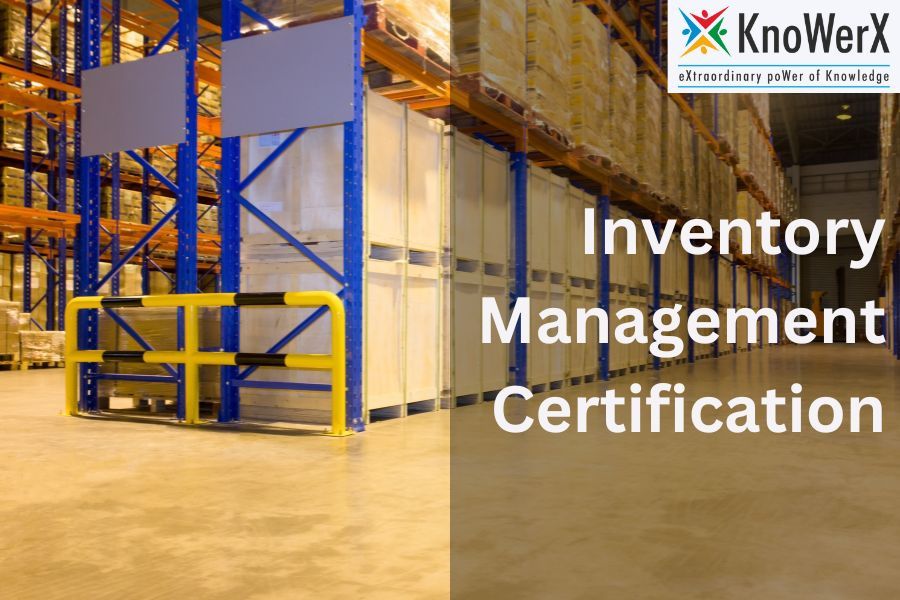
Inventory Management Certification in the Supply Chain Industry Inventory management plays a critical role in the efficiency and success of supply chain operations. It involves the strategic handling of goods and materials, ensuring the right products are available in the right quantities at the right time. This article explores the significance of inventory management within the supply chain industry and the importance of obtaining certification in this field. What Is Inventory Management? Inventory management is all about keeping track of, controlling, and making the most out of the stuff a company has and needs. It involves a bunch of tasks like figuring out how much stuff to have, guessing what the company will need later on, buying new things, storing them, and getting them to where they’re supposed to be. When done right, it helps companies have just enough stuff to meet what customers want, while also not having too much extra stuff that costs a lot. The main goal of inventory management is to find the right balance between how much stuff is available and how much is needed. By figuring out what customers will want and having the right amount of stuff, companies can avoid running out of things, spend less on storing stuff, and work more smoothly overall. Especially in today’s fast-moving business world, where what customers want changes a lot, having good inventory management is super important for staying competitive and keeping customers happy. What Is The Scope Of Inventory Management? Inventory management is all about making sure a company handles its goods smoothly and effectively. Here’s what it covers: Demand Forecasting: Predicting future demand for products based on historical data, market trends, and other relevant factors. Accurate demand forecasting is essential for ensuring that sufficient inventory is available to meet customer needs without excess or stockouts. Stock Control: Implementing strategies to regulate the quantity and movement of inventory within warehouses or distribution centers. This involves setting reorder points, safety stock levels, and implementing inventory tracking systems to monitor stock levels in real-time. Inventory Optimization: Inventory Optimization is all about making inventory work better for your business. It’s about finding ways to spend less money on storing inventory, making sure you don’t run out of stock, and getting items moving faster. We do this by using smart techniques like figuring out which items are most important (ABC analysis), calculating the best order quantities (EOQ), and using systems that deliver items just when we need them (JIT). These tricks help us save money, keep shelves stocked, and keep things flowing smoothly. What Is Required For Inventory Management? Achieving success in inventory management roles requires a combination of skills, qualifications, and personal attributes. Key requirements include: Analyzing Stuff: Inventory managers need to be good at looking at data, figuring out patterns, and using that info to decide how much stuff we need to keep, buy, or move around. Tech Savvy: They should be comfortable using computer programs made for inventory, like those fancy systems big companies use to keep track of everything they’ve got. Knowing How Things Flow: They need to understand how things move through a business, from buying stuff to getting it to customers. It’s like knowing how pieces fit together in a puzzle. Talking and Listening: They need to be able to talk to different people, like suppliers who bring in stuff or folks in the warehouse moving things around. Good communication helps make sure everyone knows what’s going on. Paying Close Attention: Details matter! They should be eagle-eyed when it comes to checking how much stuff is there and noticing if something’s not quite right. Fixing Problems: When things go wrong, they need to be like detectives, figuring out why and finding solutions, whether it’s running out of stuff or having too much. Getting Certified: Obtaining certification such as the CIMO (Certified Inventory Management Officer) offered by KnoWerX can significantly enhance one’s expertise in inventory management. While not obligatory, this certification demonstrates a deep understanding of inventory management principles and techniques, potentially broadening job prospects for individuals in the field So, by learning these skills, understanding how things move in a business, and maybe getting some extra training, folks can set themselves up for success in inventory management. It’s all about keeping things organized and running smoothly in the ever-changing world of supply chains. How To Become An Inventory Manager Educational Background: Start by getting a degree in something like supply chain management, logistics, business administration, or a similar field. This lays down the groundwork for understanding inventory management. Relevant Experience: It’s important to get hands-on experience. Look for internships or entry-level jobs in areas like inventory control, procurement, or logistics. This helps you learn the ins and outs of managing inventory. Keep Learning: Take additional courses or attend workshops focused on inventory management. This shows that you’re committed to learning and improving your skills. Get Certified: Consider getting certified in inventory management. There are certifications like CIMO (Certified Inventory Management Officer) that show you’ve mastered the practices of inventory management. Network: Build connections within the supply chain industry. This can open doors to mentorship opportunities and job openings in inventory. By following these steps, you can work your way towards becoming a successful inventory manager! Inventory Management Vs Warehouse Management Inventory management and warehouse management are both crucial parts of making sure things run smoothly in supply chains, but they handle different jobs. Inventory Management: This is about finding the right balance of stuff you have in stock. You want enough to satisfy customers without having too much and wasting money on storage or risking running out. It involves figuring out how much you’ll need, when you’ll need it, and making sure you have just the right amount at the right time. Warehouse Management: This one deals with the physical side of things – where you actually keep all that stuff. It’s about making sure everything is organized in the warehouse so you can find it easily, moving things around efficiently, and
Supply Chain Planning Certificate

Navigating the Supply Chain Planning Certificate Program Supply chain management is all about making sure things move smoothly from the makers to the buyers. And planning is a big part of making that happen well. So, if you’re interested in being great at this, getting certified in supply chain planning with KnoWerX can be a smart move. This article covers everything you need to know about it, like what it is, how to get it, what kind of jobs you can get, how much it costs, and some final thoughts to consider. What Is Supply Chain Planning? Supply chain planning is all about making sure things move smoothly from one point to another in a business’s supply chain. This includes figuring out how much stuff is needed, when it’s needed, and how to get it where it needs to go efficiently. It involves predicting what customers will want, managing how much stuff is kept in storage, scheduling when things are made, and figuring out the best ways to transport everything. Good supply chain planning helps companies meet customer needs without wasting resources or money. It’s important because it helps businesses match what they make and buy with what customers want, and with what they can do. By knowing what customers are likely to want and keeping just enough stuff on hand, companies can avoid running out of products or having too much leftover. This keeps customers happy and saves money. Also, supply chain planning helps companies make smarter decisions by giving them information about how to best use their resources, when to make things, and how to move them around efficiently. What Is A Supply Chain Planning System? A supply chain planning system is like a computer program that helps companies plan and manage their supply chain activities. It pulls together information from different places to help predict things like how much demand there will be for products, how much inventory to keep, and how to make decisions about production and transportation. These systems have special features that help with things like predicting demand, figuring out the best way to manage inventory, planning production schedules, and managing transportation. Using a supply chain planning system helps companies work more efficiently. They can use fancy math and analysis to make smarter decisions, cut down on the time it takes to get products to customers, and adapt quickly when things change in the market. These systems also make it easier for different teams within a company, as well as outside partners, to work together and stay on the same page. Supply Chain Planning Process The process of planning your supply chain usually has a few steps that are all connected: Forecasting Demand: This means trying to predict how much of your product or service people will want in the future. You look at things like past sales, what’s happening in the market, and other important info. Planning Inventory: Figuring out how much stuff you should have in stock to meet demand without having too much or too little. You want to avoid running out of stock and also don’t want to be stuck with too much stuff that you can’t sell. Organizing Production: Making a schedule for when you’ll produce your goods. This schedule should match up with what you expect people will want to buy and what resources you have available. Sorting out Distribution: Deciding the best way to move your products from where they’re made to where they’re sold. This involves getting things to distribution centers and then to customers efficiently. Working Together in the Supply Chain: This is about collaborating with everyone involved in making and selling your product. That means talking with suppliers, manufacturers, distributors, and others to make sure everyone is on the same page and things run smoothly. Supply Chain Planning Examples There are many examples of smart supply chain planning strategies used in different industries: Just-in-Time (JIT) Manufacturing: Toyota came up with this idea. Instead of making a lot of stuff and keeping it in a warehouse, they only make things when they’re needed. This saves money on storing things for a long time. Cross-Docking: Big stores like Walmart do this. They have special places called cross-docking facilities. These places help to move things from the suppliers to the stores quickly. It means they don’t have to keep stuff in the warehouse for too long. Vendor-Managed Inventory (VMI): In VMI, suppliers keep an eye on how much stuff is in the stores and fill it up when it’s running low. This helps make sure there’s always enough stuff in the store without wasting too much. It’s like having someone take care of your shopping list for you. Supply Chain Planning Jobs Professionals who specialize in supply chain planning have a variety of career options available to them, such as: Supply Chain Analyst: This role involves examining data, forecasting future trends, and finding ways to improve the efficiency of supply chain processes. Demand Planner: Demand planners predict how much of a product will be needed, manage inventory levels, and work closely with different teams to make sure products are available when customers want them. Supply Chain Manager: In this position, individuals are responsible for overseeing the entire supply chain process, from start to finish. They implement long-term strategies, make sure everything runs smoothly, and allocate resources effectively. How To Get a Supply Chain Planning Certificate? To Get a Supply Chain Planning Certificate, you’ll typically follow these steps: Choosing the Right Certificate: First things first, you want to find a Certificate program that’s well-respected in the field. Look into popular choices like the APICS Supply Chain Planning Certificate. This Certificate is highly valued and trusted by professionals. Also, check out what KnoWerX has to offer—they provide courses for supply chain planning certificates too. Meet Eligibility Requirements: Each program will have its own set of requirements. These might include having a certain level of education, relevant work experience, or completing specific training courses. Make sure you meet these
APICS CLTD Certification : Complete Guide
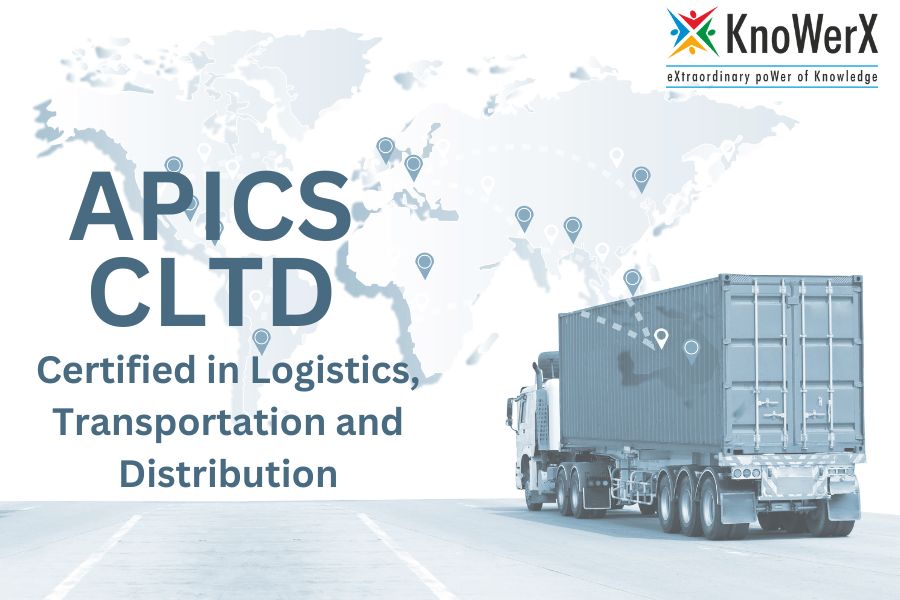
Apics CLTD (Certified in Logistics, Transportation, and Distribution) In the world of moving goods around, whether it’s by truck, plane, or other means, ensuring efficient transportation is crucial for the global supply chain. Professionals in this field are always seeking ways to showcase their expertise, and one way to do so is by obtaining the APICS CLTD (Certified in Logistics, Transportation, and Distribution) Certification. This article aims to delve deeper into the significance of the APICS CLTD Certification, exploring what it entails, how one can attain it, and why it holds such value for career advancement. By understanding the ins and outs of this certification, individuals can better grasp its importance in the logistics and transportation industry, paving the way for enhanced career opportunities and professional growth. What Is CLTD Method? The APICS CLTD Certification is all about a method that goes beyond the usual ways of doing logistics. It’s like a big-picture strategy for managing how things move and get to where they need to be in the supply chain. This method looks at transportation, distribution, and planning in a detailed way. Moving items isn’t only about going from A to B; it’s about doing it smartly, effectively, and sustainably, with modern tech. When people dive into this method, they learn a set of skills that match what the industry needs. It’s like becoming an expert in navigating the complicated world of logistics. But the CLTD method isn’t just theory – it’s a practical toolkit. It gives professionals the tools they need to tackle real problems in logistics. By thinking strategically and taking a big-picture approach, professionals can make operations smoother, save money, and make the supply chain stronger. The focus on efficiency and sustainability is all about keeping up with the current trend of responsible logistics management. This makes the CLTD method not just a thing for today but something that’s ready for the future. It’s a framework that can adapt to changes and help professionals make a real impact in the field. How Do I Get A CLTD Certificate? Getting a CLTD certificate involves a thoughtful and organized approach that requires dedication. Before diving into the certification process, candidates need to meet certain educational and professional requirements. This sets the foundation for a thorough evaluation of their skills. The certification process itself is challenging, with exams covering important aspects of logistics, transportation, and distribution. To tackle this, Apics provides various resources like study materials, practice exams, and specialized training courses. Engaging with these resources helps candidates not only gain the knowledge necessary for the exams but also practical insights crucial for their professional growth. Obtaining the CLTD certification goes beyond just academics; it’s a transformative experience that sharpens practical skills and problem-solving abilities. The structured nature of the process ensures that certified professionals are well-prepared to handle the diverse challenges in logistics and supply chain management. It’s not just about theoretical knowledge; the certification process emphasizes applying concepts in real-world situations, fostering a mindset focused not only on passing exams but also on creating tangible value in the professional field. Is CLTD Certification Worth It Should you consider getting the CLTD Certification? Well, it’s more than just a fancy title on your resume. This certification is like a badge of honor for folks in the logistics field. It shows you’re serious about doing your job well. Getting certified isn’t just a one-time thing. It’s an investment that keeps paying off. It can open doors to better job opportunities and even fatter paychecks. Plus, it puts you in the spotlight as someone who knows their stuff in the competitive logistics world. And it’s not just about you. When you get CLTD certified, it’s like sending a ripple through the whole industry. Employers love having certified folks on their teams. It’s a sign that they’ve got someone who really understands the ins and outs of logistics. In a world where every detail matters, having CLTD Certification is like a stamp of approval. It tells everyone around that you’ve got the skills to handle the challenges of modern logistics. So, if you’re thinking long-term and want to make a mark in the logistics world, getting CLTD certified is a smart move. What Is The Difference Between CPIM And CLTD? Certainly! Let’s dive deeper into the distinctions between CPIM (Certified in Production and Inventory Management) and CLTD (Certified in Logistics, Transportation, and Distribution) certifications within the realm of supply chain management. CPIM is all about what’s happening within a company’s supply chain. It hones in on the internal aspects, particularly focusing on how production processes are managed and how inventory is handled within the company. Individuals pursuing CPIM are often those deeply involved in the intricacies of production and ensuring efficient inventory management to keep things running smoothly inside the organization. On the other hand, CLTD broadens the scope significantly. It looks beyond the internal workings of a company and delves into the external factors of the supply chain. CLTD covers areas like transportation, distribution, and logistics planning. Professionals aiming for CLTD are those whose responsibilities extend beyond the company’s walls. They are concerned with how goods are transported, distributed, and the overall strategic planning involved in the larger logistics landscape. These differences go beyond just the logistics of a supply chain; they reflect diverse career paths within the broader domain of supply chain management. CPIM is tailored for those primarily engaged in production and inventory management within a company, ensuring the internal processes run efficiently. In contrast, Apics CLTD is designed for individuals whose responsibilities involve the external aspects of the supply chain, encompassing transportation, distribution, and logistics planning. Recognizing these distinctions is crucial for professionals as they strategically align their career goals with the certification that best suits their aspirations. This understanding empowers individuals to make informed decisions about their certification choices, aligning them with their specific career objectives within the multifaceted world of supply chain management. Who Is Eligible For CLTD Exam? To start your CLTD certification
Certified Integrated Business Planner (CIBP) Certification
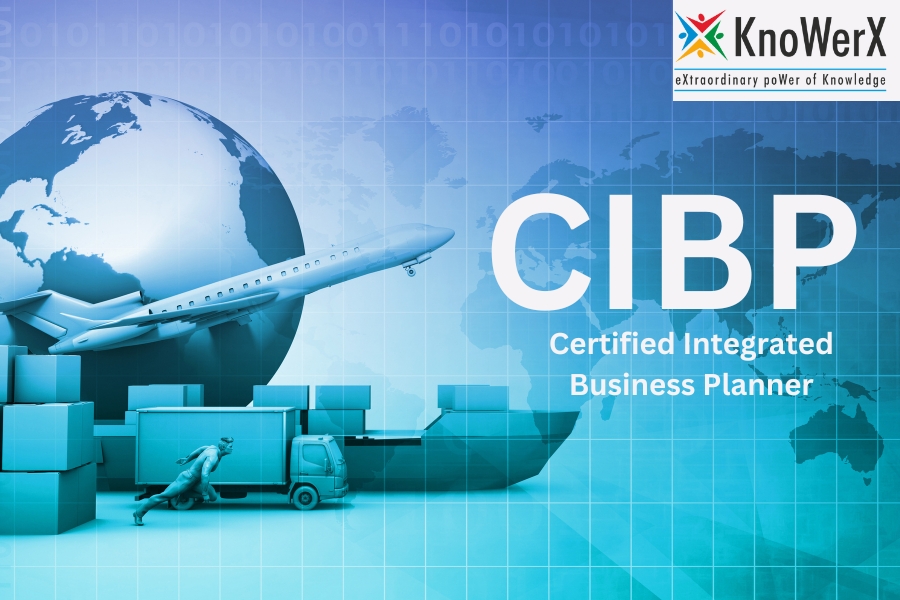
Unlocking Business Potential: The Certified Integrated Business Planner (CIBP) Certification Explained In today’s fast-paced business world, companies need skilled professionals who can tackle challenges head-on and steer business strategies in the right direction. That’s where the Certified Integrated Business Planner (CIBP) certification comes in. It’s like a stamp of approval, showing that someone has expertise in strategic planning, forecasting, supply chain management, and financial know-how. Importance in Business Planning Effective business planning is like building a sturdy house on a solid foundation. The Certified Integrated Business Planner (CIBP) certification emphasizes just how crucial it is to align big-picture goals with day-to-day operations. It’s about making sure businesses can roll with the punches of the market, make the most of resources, and make smart decisions. With this certification, professionals are armed with the skills to guide businesses through changes and keep them growing strong, even when the business landscape gets rocky. What is Certified Integrated Business Planner (CIBP) Certification? Definition and Overview Certified Integrated Business Planner (CIBP) Certification is like a badge of honor for people who know their stuff regarding integrated business planning. It shows they’ve got a solid grasp on balancing demand and supply, crunching numbers, managing risks, and making smart decisions involving different parts of a company working together. Accrediting Body and Standards This certification isn’t just handed out to anyone. It’s overseen by respected organizations that make sure the standards are super high. They work closely with industry experts to keep the certification program up-to-date with the latest ideas and technologies in business planning. They also regularly check in to make sure the program stays relevant as things change in the business world. Eligibility Criteria To achieve Certified Integrated Business Planner (CIBP) Certification, participants need to meet certain standards. This usually means they should have a basic grasp of how businesses are managed and how processes work, especially in the planning part. It might also require having some experience in things like managing supply chains or handling finances. What Does Certified Integrated Business Planning Do? Role and Responsibilities of Certified Integrated Business Planner (CIBP) Professionals: Certified Integrated Business Planners have a crucial job within companies. They’re like the conductors of an orchestra, making sure all the different parts – like finance, sales, operations, and supply chain management – work together smoothly. Using their skills in analyzing data, making predictions, and planning strategically, Certified Integrated Business Planner (CIBP) professionals ensure that every department is working towards the same big goals. Importance in Business Strategy: Integrated business planning isn’t just about short-term fixes; it’s a big part of long-term strategy for businesses today. Certified Integrated Business Planner (CIBP) professionals play a key role in shaping and carrying out these strategies. They dive deep into data analysis and planning for different scenarios to provide valuable insights. Their input ensures that strategies aren’t just good ideas but also practical for how the company works daily. Integration with Organizational Functions: Integrated business planning looks at the whole picture of how a company runs. Certified Integrated Business Planner (CIBP) professionals are like the glue that holds different parts of the company together. They encourage teamwork between departments, breaking down barriers and making sure everyone’s on the same page. By smoothing out processes across the board, they make communication, resource management, and decision-making easier. This helps the company stay nimble and responsive in a fast-paced business world. Certified Integrated Business Planner (CIBP) Benefits Better Business Performance: When businesses adopt integrated planning led by Certified Integrated Business Planner (CIBP) experts, they tend to perform better in various aspects. Companies can use their resources more wisely, cut down on waste, and grab hold of growth opportunities more effectively by making sure that their big-picture goals match up with day-to-day activities. Smarter Decision Making: Making smart choices is crucial in today’s complicated business world. Certified Integrated Business Planner (CIBP) professionals give companies the tools and knowledge they need to make decisions based on data. By bringing together different pieces of information and exploring different scenarios, they give decision-makers a clear picture of what could happen with each choice. Smoother Operations: The key to any organization’s success is having smooth operations. Getting certified in CIBP helps a lot with this. Certified Integrated Business Planner (CIBP) experts know how to make processes work better and measure how well things are going. They help get rid of things that slow things down and make everything run more efficiently. More Efficiency and Productivity: Certified Integrated Business Planner (CIBP) professionals are great at bringing different parts of a company together and making sure everyone is working well together. By finding ways to do things better, cutting out things that aren’t needed, and finding areas to improve, they help companies keep getting better and better at what they do. Certified Integrated Business Planning Example Real-Life Case Study: How a Big Company Improved with Better Planning Imagine a big company that sells all sorts of everyday items worldwide. They’re in a tough market with lots of competition. To keep their lead, they decided to try something new: a Certified Integrated Business Planner (CIBP). This means they’re bringing together their sales, marketing, finance, and supply chain teams to work more closely. They want to use data and teamwork to predict what customers will want, manage their stock better, and run their business smoothly. How They Made It Happen and What Changed First, everyone from different parts of the company started talking more. They set clear goals and figured out the important numbers to watch. They also used fancy tools to guess what customers might buy next. Then, in meetings, they made plans together. This way, everyone knew what to do to make the most of good chances and avoid problems. After using Certified Integrated Business Planner (CIBP), the company noticed some great changes. They could deliver things quicker, didn’t have too much stock lying around, and customers seemed happier. Plus, they started making more money. By always looking for ways to do better and
APICS CPIM (Certified in Planning & Inventory Management)
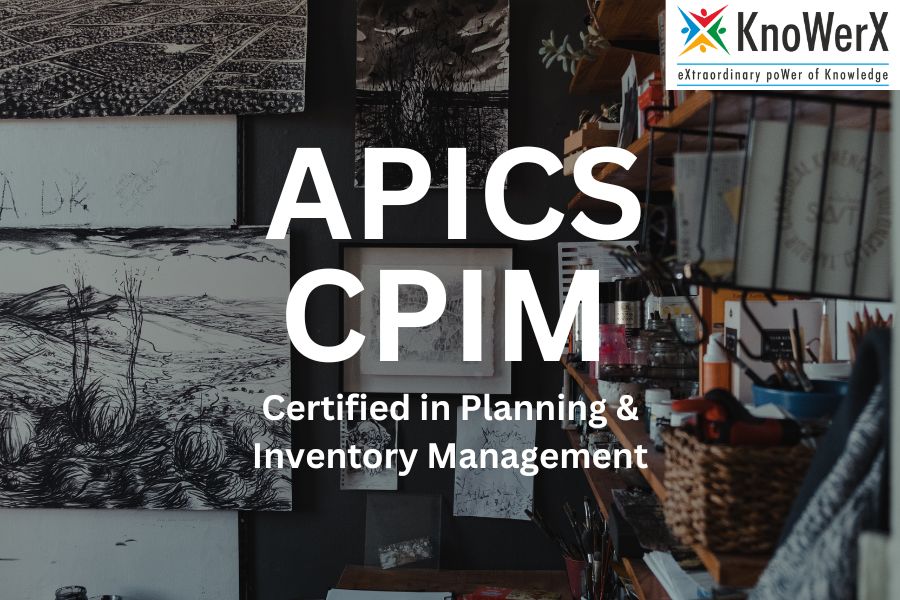
APICS CPIM (Certified in Planning & Inventory Management): A Comprehensive Guide APICS CPIM (Certified in Planning & Inventory Management) certification is highly respected in the world of supply chain management. It’s recognized globally for its thorough coverage and relevance to the industry. This article aims to give you a clear understanding of APICS CPIM, covering its importance, benefits, who can apply, what’s required, job opportunities, how long it takes to prepare, how tough the exam is, and the cost, especially in India. Let’s start with the big picture. APICS CPIM certification is a significant achievement for professionals aiming to succeed in the fast-paced world of supply chain operations. Throughout this article, we’ll delve into the details, uncovering why it’s so valuable in today’s competitive job market. By the end, you’ll have a deep understanding of APICS CPIM, helping you decide if it’s the right step for your career in the supply chain industry. What Is APICS CPIM? APICS CPIM, which stands for Certified in Planning & Inventory Management, is a certification designed to help people become experts in managing planning and inventory within supply chains. It’s like a guidebook that gives professionals the essential knowledge and skills they need to excel in their roles in the ever-changing world of supply chain operations. This certification covers a wide range of important topics, like keeping track of inventory, planning production strategically, and making accurate forecasts. By focusing on these key areas, individuals working towards APICS CPIM certification can improve how they work, making them more effective and efficient within their organizations. So, APICS CPIM isn’t just a certification. It’s a journey that helps people become better at managing supply chains, ultimately leading to operational excellence. APICS CPIM Certification Benefits APICS CPIM certification has lots of perks. It can open up better job opportunities, help you earn more money, and make you better at your job. Plus, it shows you’re serious about learning and growing in your career. When you’re certified, you stand out to employers. They appreciate the skills and knowledge that come with the certification, so they’re more likely to hire you. This means you have an edge over others when applying for jobs. Getting certified also proves you know your stuff when it comes to planning and managing inventory. It shows you’ve put in the effort to understand the important parts of supply chain management. This makes employers and your colleagues trust you more. APICS CPIM Eligibility To qualify for APICS CPIM certification, you need to meet certain criteria set by APICS. This includes having the right education and work experience in supply chain management or related areas. Normally, you’ll need at least a bachelor’s degree or its equivalent, along with at least two years of relevant work experience. APICS CPIM certification is made for people at different points in their careers, whether you’re just starting out or you’ve been in the industry for a while. By setting clear eligibility standards, APICS ensures that candidates have the necessary background and experience to do well in the certification process and in their roles after getting certified. APICS CPIM Requirements To obtain the APICS CPIM 8.0 certification, candidates must fulfill certain requirements: Eligibility: There are no specific eligibility requirements to register for the CPIM exam. However, candidates should have a basic understanding of manufacturing, inventory management, and supply chain concepts to enhance their chances of success. Exam Completion: Candidates must successfully complete the CPIM exam to earn the certification. The exam assesses competency in planning and inventory management. Passing Score: A score of 300 or higher is required to pass the CPIM exam. APICS CPIM Jobs APICS CPIM certification opens up a wide range of job opportunities in industries such as manufacturing, logistics, retail, and consulting. Job roles may include supply chain planner, inventory analyst, production scheduler, materials manager, and procurement specialist, among others. Professionals with APICS CPIM certification are in high demand due to their expertise in planning and inventory management. Employers value the skills and knowledge that come with the certification, making certified professionals highly sought after in today’s competitive job market. Additionally, APICS CPIM certification can lead to career advancement opportunities and increased earning potential for certified professionals. Is APICS CPIM Worth It? Determining whether it’s worth getting an APICS CPIM certification depends on your career goals, what you aspire to achieve, and whether there’s a demand for it in your field. If you’re aiming to climb the ladder in supply chain management, then CPIM could really boost your prospects. This certification is widely known and respected in the industry, which means having it can help you stand out from the crowd. Plus, going through the process of getting certified doesn’t just mean adding a fancy title to your resume – it means gaining valuable skills and knowledge that can make you more effective in your job. And when you’re better at what you do, that often leads to more opportunities for advancement. So, if you’re serious about a career in supply chain management and you want to give yourself an edge, investing your time and effort into getting CPIM certified could definitely pay off in the long run. How Long Does It Take To Study For APICS CPIM? The amount of time you’ll need to study for APICS CPIM certification can vary quite a bit. It really depends on how quickly you learn, what you already know, and how much time you can commit to studying. Typically, people spend several months getting ready for each module of the CPIM certification. This isn’t something you can cram for in just a few days. It takes time to really understand all the material and be able to apply it. Studying for the CPIM certification is no walk in the park. You’ll be covering a lot of different topics and concepts, so you’ll need to be prepared to put in some serious effort. That means making a plan and setting aside time each day or week to go over
Certified Supply Chain Professional Program (CSCP)
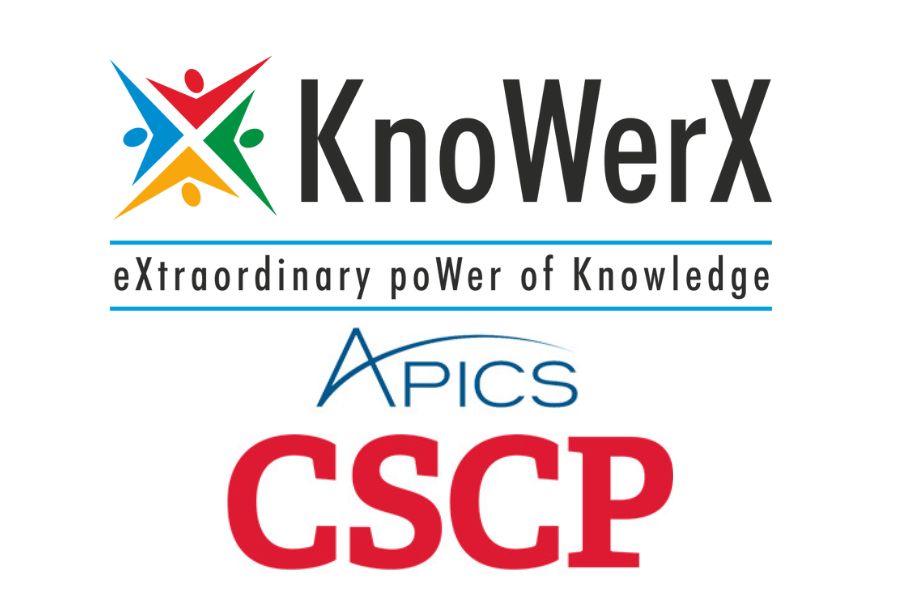
Unraveling the Certified Supply Chain Professional Program (CSCP) In today’s fast-changing business world, making sure things run smoothly in the supply chain is super important for companies to stay competitive and do well. That’s where the Certified Supply Chain Professional (CSCP) program comes in. APICS offers it and it’s a big deal for folks who want to become experts in managing supply chains. Supply chains are like the backbone of modern businesses. They’re the complex web of activities involved in getting stuff from where it’s made to where it needs to go, all around the world. Managing this process well doesn’t just save money and make things work better, it also helps companies come up with new ideas and keeps customers happy. As businesses go global and technology keeps changing how things work, having skilled people who know how to manage supply chains is more important than ever. That’s why organizations are starting to see the value in professionals who’ve gone through the Certified Supply Chain Professional program. What Is APICS CSCP? The Certified Supply Chain Professional program, also known as APICS CSCP, is a well-known certification recognized worldwide. It’s all about giving professionals the tools they need to succeed in managing supply chains effectively. Created by the Association for Supply Chain Management (ASCM), formerly called APICS, this program covers a wide range of important topics like supply chain strategy, risk management, and sustainability. Through intense coursework, practical case studies, and real-world examples, the CSCP program prepares individuals to handle the challenges of modern supply chains and make businesses successful. Supply chain professionals are crucial for keeping operations running smoothly, cutting costs, and keeping customers happy. They use their knowledge of things like demand planning, inventory management, and logistics to make organizations more efficient and profitable. In today’s fast-paced world, supply chain professionals also play a big part in reducing risks and making sure businesses keep running, even when things get tough. As companies work to keep up with changes in the market and what customers want, there’s a growing need for skilled supply chain professionals. That’s why getting certified through the APICS CSCP program can boost your career. What Is A Supply Chain Professional? A supply chain professional is someone who manages the entire process of getting a product from the beginning stages of production to its delivery to customers. They’re like problem-solving experts who look at every step of this process to make it as smooth and cost-effective as possible. This involves working closely with suppliers, manufacturers, distributors, and retailers to make sure everything runs well. One important aspect of being a supply chain professional is communicating effectively and leading teams. They need to analyze a lot of data to figure out where things can be improved and then come up with solutions to make those improvements happen. Whether it’s making sure there’s enough inventory, negotiating deals with suppliers, or finding better ways to transport goods, supply chain professionals are crucial for making sure everything runs smoothly. If someone wants to become a certified supply chain professional, they can enroll in a program like the Certified Supply Chain Professional program. This program teaches all the skills and knowledge needed to excel in this field, from understanding the basics of supply chain management to mastering advanced techniques for optimizing processes and solving problems. By completing this program, individuals can demonstrate their expertise and increase their chances of success in the supply chain industry. How To Become A Certified Supply Chain Professional? To become a Certified Supply Chain Professional involves a few steps. First, you need to make sure you meet the requirements set by ASCM for the Certified Supply Chain Professional program. These requirements usually include having a certain level of education and work experience in supply chain management or related areas. Once you’re eligible, you can sign up for the Certified Supply Chain Professional program and start getting ready for the certification exam. The exam covers three main areas: Supply Chain Design, Supply Chain Planning and Execution, and Supply Chain Improvement and Best Practices. To prepare, you can study on your own, take classes with an instructor, or use online resources. Preparing for the exam takes time and effort. You need to thoroughly go over the exam outline and make sure you understand all the important concepts and principles in supply chain management. Practice exams and study materials can help you identify any areas where you need more work and reinforce what you’ve learned. It’s also a good idea to reach out to other professionals in the field for advice and support. By putting in the effort to prepare for the exam, you can improve your chances of passing and open up new opportunities for advancing your career as a Certified Supply Chain Professional. The value of the APICS CSCP certification goes beyond just having a certificate. It shows a dedication to excellence and growth in the supply chain management field. People who are certified gain access to a wide network of peers, mentors, and experts, which can lead to new career opportunities and advancement. The program’s curriculum is thorough and practical, giving individuals insights that can make a real difference in their organizations. Achieving CSCP certification is a big accomplishment in a person’s career. It proves they have mastered important supply chain concepts and methods, making them more credible and attractive to employers. Many senior-level roles and leadership positions in supply chain management require CSCP certification. By investing in their professional development and continuing to learn, people can set themselves up for long-term success and open up new paths for growth. Overall, the APICS CSCP certification is highly valuable for anyone looking to advance their career in supply chain management. It provides essential knowledge and opens doors to new opportunities, making it a worthwhile investment in one’s future. Additionally, the Certified Supply Chain Professional program is known for its comprehensive curriculum and practical insights, making it a valuable asset for professionals in the field. How
